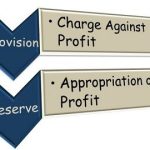One of the most significant accounting concepts is “Concept of Income”. Similarly, measurement of a business income is also an important function of an accountant.
In General term, payment received in lieu of services or goods are called income, for example, salary received by any employee is his income. There may be different type of incomes like Gross income, Net income, National Income, and Personal income, but we are here more concerned for a business income. Surplus revenue over expenses incurred is called as “Business Income.”
Objectives of Net Income
Following are the important objectives of a net income −
· Historical income figure is the base for future projections.
· Ascertainment of a net income is necessary to give portion of profit to employees.
· To evaluate the activities, which give higher return on scarce resources are preferred. It helps to increase the wealth of a firm.
· Ascertainment of a net income is helpful for paying dividends to the shareholders of any company.
· Return of income on capital employed, gives an idea of overall efficiency of a business.
Definition of Income
The most authentic definition is given by the American Accounting Association as −
“The realized net income of an enterprise measures its effectiveness as an operative unit and is the change in its net assets arising out of a (a) the excess or deficiency of revenue compared with related expired cost, and (b) other gains or losses to the enterprise from sales, exchange or other conversion of assets:”.
According to the American Accounting Association, to be as business income, income should be realized. For example, to be a business income, only appreciation in value of assets of a company is not enough, for this, asset has really been disposed of.
Accounting Period
For the measurement of any income concerns, instead of a point of time, a span of time is required. Creditors, investors, owners, and government, all of them require systematic accounting reports at regular and proper intervals. The maximum interval between reports is one year, as it helps a businessman to take any corrective action.
An accounting period concept is directly related to matching concept and realization concept; in the absence of any of them, we could not measure income of the concerns. On the basis of matching concept, expenses should be determined in a particular accounting period (usually a year) and matched with the revenue (based on realization concept) and the result will be income or loss of the accounting period.
Accounting Concept and Income Measurement
The measurement of accounting income is the subject to several accounting concepts and conventions. Impact of accounting concepts and convention on measurement of the accounting income is given below −
Conservatism
Where an income of one period may be shifted to another period for the measurement of income is called as ‘conservatism approach.’
According to the convention of conservatism, the policy of playing safe is followed while determining a business income and an accountant seeks to ensure that the reported profit is not over stated. Measurement of a stock at cost or market price, whichever is less is one of the important examples as applied to measurement of income. But it must be insured that providing excessive depreciation or excessive provisions for a doubt full debt or excessive reserve should not be there.
Consistency
According to this concept, the principle of consistency should be followed in accounting practice. For example, in the treatment of assets, liabilities, revenues, and expenses to insure the comparison of accounting results of one period with another period.
Therefore, the accounting profession and the corporate laws of most of the counties require that financial statement must be made out on the basis that the figures stated are consistent with those of the preceding year.
Entity Concept
Proprietor and business are the two separate and different entities according to the entity concept. For example, an interest on capital is business expenditure, but for a proprietor, it is an income. Thus, we cannot treat a business income as personal income or vice-versa.
Going Concern Concept
According to this concept, it is assumed that business will continue for a long time. Thus, charging depreciation on a Fixed Asset is based on this concept.
Accrual Concept
According to this concept, an income must be recognized in the period in which it was realized and costs must be matched with the revenue of that period.
Accounting Period
It is desirable to adopt a calendar year or natural business year to know the results of business.
Computation of Business Income
To compute business income, following are the two methods −
Balance Sheet Approach
Comparison of the closing values (Assets minus outsider’s liabilities) of a firm with the values at the beginning of that accounting period is called as Balance Sheet approach. In above value, an addition to capital will be subtracted and addition of drawings will be added while computing the business income of a firm. Since, income is calculated with the help of Balance Sheet hence called as Balance Sheet approach.
Transaction Approach
Transactions are mostly related to production or the purchase of goods and the sale of goods and all these transactions directly or indirectly related to the revenue or to the cost. Therefore, surplus collection of the revenue by selling goods, spent over for production or purchasing the goods is the measure of income. This system is widely followed by the enterprises where double entry system adopted.
Measurement of Business Income
There are following two factors which are helpful in the estimation of an income −
· Revenues − Sale of goods and rendering of services are the way to generate revenue. Therefore, it can be defined as consideration, recovered by the business for rendering services and goods to its customers.
· Expenses − An expense is an expired cost. We can say the cost that have been consumed in a process of producing revenue are the expired cost. Expenses tell us – how assets are decreased as a result of the services performed by a business.
Measurement of Revenue
Measurement of the revenue is based on an accrual concept. Accounting period, in which revenue earned, is the period of revenue accrues. Therefore, a receipt of cash and revenue earned are the two different things. We can say that revenue is earned only when it is actually realized and not necessarily, when it is received.
Measurement of Expenses
· In case of delivery of goods to its customers is a direct identification with the revenue.
· Rent and office salaries are an indirect association with the revenue.
There are four types of events (given below) that need proper consideration about as an expense of a given period and expenditure and cash payment made in connection with those items −
· Expenditure, which are expenses of the current year.
· Some expenditure, which are made prior to this period and has become expense of the current year.
· Expenditure, which is made this year, becomes expense in the next accounting periods. For example, purchase of fixed assets and depreciation in next up-coming years.
· Expense of this year, which will be paid in next accounting years. For example, outstanding expenses.
Matching Concept
It is a problem of recognition of revenue during the year and allocation of expired cost to the period.
Recognition of Revenue
Most frequent criteria, which are used in recognition of the revenue are as follows −
· Point of Sale − Transfer of ownership title to a buyer is point of sale, in case of sale of commodity.
· Receipt of Payment − Criteria of cash basis is widely used by the attorneys, physicians, and other professionals in which revenue is considered to be earned at the time of collection of cash.
· Instalment Method − Instalment method is widely used in retail trading specially in consumer durables. In this system, revenue earned is treated in the same manner as is used in any other credit sale.
· Gold Mines − The accounting period in which gold is mined is the period of revenue earned.
· Contracts − Degree of contract completion, especially in long term construction contracts is based on percentage of completion of a contract in a single accounting year. It is based on total estimated life of the contract.
Allocation of Costs
Matching of expired revenue and expired costs on a periodic time basis is the satisfactory basis of allocation of cost as stated earlier.
Measurement of Costs
Measurement of costs can be determined by −
· Historical Costs − To determine periodic net income and financial status, historical cost is important. Historical cost actually means – outflow of cash or cash equivalents for goods and services acquired.
· Replacement Costs − Replacing any asset at the current market price is called as replacement cost.
Basis of Measurement of Income
Following are the two significant basis of measurement of income −
· Accrual Basis − In an accrual basis accounting, incomes are recognized in a company’s books at the time when revenue is actually earned (however, not essentially received) and expenses is recorded when liabilities are incurred (however, not essentially paid for). Further, expenses are compared with revenues on the income statement when the expenses expire or title has been transferred to the buyer, and not at the time when the expenses are paid.
· Cash Basis − In a cash basis accounting, revenues and expenses are recognized at the time of physical cash is actually received or paid out.
Change in the Basis of Accounting
We have to pass adjustment entries whenever accounting records change from cash basis to accrual basis or vice versa specially in respect of the prepaid expenses, outstanding expenses, accrued income, income received in advance, bad debts & provisions, depreciation, and stock in trade.
Features of Accounting Income
Followings are the main features of accounting income −
· Matching revenue with related cost or expenses is a matter of accounting income.
· Accounting income is based on an accounting period concept.
· Expenses are measured in terms of a historical cost and determination of expenses is based on a cost concept.
· It is based on a realization principal.
· Revenue items are considered to ascertain a correct accounting income.



Comments are closed